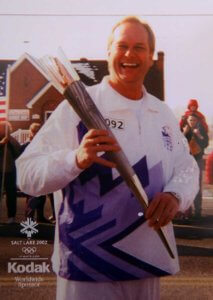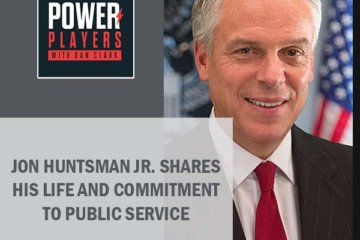I am always inspired by the Olympic Games and emotionally moved by the opening ceremonies. The spirit of the 2002 Winter Games in Salt Lake City especially touched my heart—the Native Americans on horseback, the dancing to the drums. When they brought in the ripped, battered, and torn American flag that was flying on the World Trade Center on September 11, there wasn’t a dry eye in the fifty-thousand-seat stadium. The lighting of the Olympic flame sent chills up and down my spine and added a giant crescendo to what would be one of the most significant experiences of my life.
On February 6, 2002, I was deeply honored and privileged to be one of the torchbearers who carried the Olympic flame. There were only 11,520 of us who carried the flame an average of two-tenths of a mile at a time, passing it from one to another across forty-six states. The flame was handed person to person until it was passed more than 13,500 miles on a journey that took a total of sixty-five days.
Each of us runners proudly held the thirty-three-inch, three-and-a-half-pound butane-fired torch, and each of us had been nominated and selected because of our stories. There were cancer survivors and physically challenged people young and old. A high school student ran in front of his campus wearing the shoes of his brother who had been killed at that spot a week earlier.
 I ran the torch on the sixty-third day and was blessed to be the final runner of the day, which meant I got to carry it one-half mile and light the cauldron in the back of the specially designed truck to transport the flame to the next city. I was so emotionally moved by the whole experience that tears flowed down my cheeks for most of my run. My personal story and experience is worth telling, but not here and now. The story I wish to share epitomizes the power of the flame and defines the motto engraved on every torch: “Light the Fire Within.”
I ran the torch on the sixty-third day and was blessed to be the final runner of the day, which meant I got to carry it one-half mile and light the cauldron in the back of the specially designed truck to transport the flame to the next city. I was so emotionally moved by the whole experience that tears flowed down my cheeks for most of my run. My personal story and experience is worth telling, but not here and now. The story I wish to share epitomizes the power of the flame and defines the motto engraved on every torch: “Light the Fire Within.”
As each of us was notified that we had been selected to carry the torch, we received a white running suit (in our previously specified size) and a detailed account of when and where we would be running. On the day of my run, all runners attended a special orientation, where it was pointed out with extreme emphasis that when we had our torch ignited by the oncoming torchbearer and his or her torch was immediately extinguished, that each of us, for that one moment in time, would be the keeper of the sacred Olympic flame; that for that brief moment, I would be the only one in the entire world holding and displaying the last pure sign of international world peace left on the planet! Wow! What a mind-boggling, awesome opportunity and responsibility.
The orientation was conducted by a young man and young woman in charge of the entire sixty-five-day torch relay. Their job was to make sure every runner showed up at his or her location so the relay never missed a beat. If there was a last-minute cancellation, they were equipped in the official van with extra running suits in every size to accommodate a last-minute replacement runner.
When one man with cancer received his letter stating that he had been nominated to carry the torch, he immediately put the date on his calendar. Against his doctor’s advice, he trained to be in shape when the day came. His cancer spread, and his training threw him into a coma. The lady in charge of the relay was notified, and while she was arranging a replacement runner, the man miraculously came out of his two-week coma on the morning of his run. An ambulance delivered him to the pick-up point. He was assisted to the middle of the road with his torch to receive the flame from the oncoming runner, had his torch ignited and proudly ran his quarter-mile segment.
No one could believe it, and everyone cheered as they witnessed the inner strength exposed and supported by the spirit and power of the Olympic flame. As soon as the man lit the next runner’s torch and his torch was extinguished, he collapsed in the road and was put back in the ambulance. Seconds later, he lapsed back into a coma and died soon after returning to the hospital. On one morning in Houston, Texas, a call came in that an elderly woman would not be able to make it for her relay segment. Scrambling to find a qualified substitute, the young woman in charge was driving the van down the route and passed by an elementary school. She immediately stopped and ran into the building. Frantically she introduced herself and asked the principal to help her. Who would she select to carry the Olympic Torch? A teacher, a counselor, an A student?
The young woman told the principal, “I need the child in your school who kids make fun of, who doesn’t have a lot of friends and usually sits alone—the student who has a tough home life and struggles with his or her schoolwork.” The principal’s face lit up like a Christmas tree. “I have just the lad you’re looking for!”
The principal introduced the young woman to a tiny, shoddy-looking fourth grade boy. He was secretly outfitted in his very own official torch relay tracksuit, given a brief orientation, and escorted out of school to join the other relay runners in the van. No one in the school knew what was happening except that they were excused from class and assembled on the sides of the street in front of their school to join the thousands of other people already gathered, ready, and waiting to wave their flags and cheer on the lone torchbearer who would run right in front of them.
The relay van finally pulled up and stopped at the end of the road. The oncoming torch runner was greeted with screams and yells. Some onlookers were even moved to tears. As he drew near, the van door opened, and out into the street stepped the young fourth-grader all decked out in his white suit and holding the torch that was almost as big as he was. The torchbearer ignited his torch and the little lad began to jog.
The first sounds from his fellow students and school faculty members were moans and gasps of disbelief. Comments quickly turned negative: “How did he get out there? He must have stolen the torch! My wife’s sister’s dog’s mother-in law said he would never amount to a hill of beans!”
Although he could hear the mean-spirited, cutting comments, because of the orientation, this young lad fought back his tears of pain and insecurity, kept his head up, and held the torch with pride and dignity. As he ran, a schoolmate shouted out his name in disgust. But the mean comment didn’t have a derogatory effect. The crowd embraced it as a positive and started chanting his name. The teachers and students couldn’t believe it, but were caught up in the excitement and one by one joined in. As he ran past his now encouraging, cheering classmates and ignited the next torchbearer’s torch, the crowd got louder and louder. Tears filled most of the faculty’s eyes.
As his flame was extinguished by the motorcycle policeman escorting him and he boarded the van to return back to his pickup point, it was explained to the onlookers that for that one moment in time, this little fourth-grader was the official ambassador of world peace; that he, though young and small, was for that brief time, one of the most important and significant people in the entire world.
Two days later, the young woman in charge of the relay received a handwritten FedEx letter from the principal. It simply read, “I trust you already know the power of the flame. I’m confident you already realize the self-fulfilling prophecy of the Olympic motto. But you have no idea what that one magical torch-running moment did to change the attitudes of my faculty and transform the tolerance level of my students. This one experience truly did ‘Light the Fire Within.’ Thank you. You have changed our school and our community forever. P.S. Billy no longer sits alone!”
As this Rio 2016 Games of the XXXI Olympiad come to a close, and in the next and subsequently following Olympic Games, let us rekindle our desire to help ourselves and others. Light the Fire Within and never ever forget the power of the flame!


